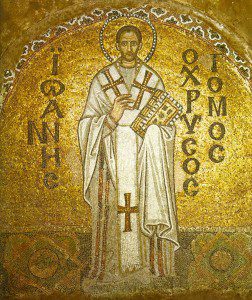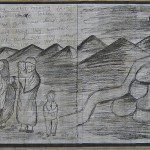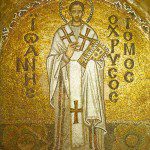What’s the greater work: to teach a child the Sign of the Cross or to build the most magnificent edifice?

For Saint John Eudes, the answer is clear: “To teach even a child to make the sign of the cross or instruct one of God’s little ones, is a nobler work in the eyes of God than all human and natural undertakings.”
Saint John Eudes wrote this in his handbook The Good Confessor (1644) now found in the compilation The Priest: His Dignity and Obligations (1945). In a section titled “Zeal for the Salvation of Souls”, the Saint submits salvation as “the work of works, surpassing all others in time or eternity.”
He writes,
What indeed would be considered great human endeavors? Constructing great palaces or public buildings, raising armies and marching at their head into battle, being acclaimed as a mighty ruler? These would be great, no doubt, but remember the words of Sacred Scripture, “Vanity of vanities and all is vanity” (Eccles. 1, 2). All these things vanish and pass away. “That which is high to men is an abomination before God” (Luke 16, 15). To teach even a child to make the sign of the cross or instruct one of God’s little ones, is a nobler work in the eyes of God than all human and natural undertakings.
Saint John Eudes goes on to cite St. John Crysostom¹:
The salvation of one soul is far greater than fasts or vigils or the austerities of the hermits; it is greater than to give more generous alms to the poor.
In basic catechesis for children and all those who are new to the faith, the Sign of the Cross is foundational.
In a text published posthumously, The Apostolic Preacher, Saint John Eudes explains:
As the sign of the cross is most important, and yet so many persons persist in making it irreverently and carelessly, no catechism class could begin better than by insisting on the correct use of this blessed act of faith.
It is the first external action we should perform when we wake up, and the last we should perform prior to falling asleep, and it should be done with the greatest reverence.
From another text, The Life and the Kingdom of Jesus in Christian Souls (1637), Saint John Eudes instructs:
Let your first exterior action be the Sign of the Cross: “In the Name of the Father, and of the Son, and of the Holy Ghost,” at the same time giving yourself with your whole heart to the Father, the Son, and the Holy Ghost in order that they may possess you entirely.
And prior to bed:
Finally, take care that your last action before falling asleep is the sign of the Cross; and that your last thought is of Jesus, that your last inward act is an act of love for Jesus and Mary. Thus you may merit the grace that the last words you say in your life will be these: Jesus! Maria! Live Jesus and Mary! O Good Jesus, be Jesus to me! O Mary, Mother of Jesus, be the Mother of my soul!
Here, then, we begin to learn the importance of the holy Sign of the Cross and its place in the work of salvation. Let us be mindful to learn its significance and to teach others of its greatness.
Nevertheless, while we must accept the primacy of salvation, we would be foolish to understand it in a way that neglects the wholeness of a creature. The Word became Flesh, did not remain simply spirit, but took on humanity, which is both material and immaterial. (St. John Chrysostom presents this beautifully in his Christmas homily.) Thus, without expanding too much further, we’ll recall the words of Saint John Eudes on the importance of caring for those in need:
Pray to Our Lord, especially, to implant in your heart charity and warm affection for the poor, strangers, widows and orphans. Consider such as these to be persons recommended to you by your greatest friend, Jesus Christ, who in Holy Scripture very Often and very emphatically recommends them to you as deserving all the attention you would give to Him in person. With this in mind, then, be kind in speaking to them, treat them charitably and give them all the help you can.

from the Hagia Sophia. / Public Domain
“Give them all the help you can” is something to consider while so many perished on the feast of Our Lord’s Nativity.
Take Saint John Chrysostom’s guidance, and do not deny the corporal necessities of Jesus in the poor and vulnerable:
For what is the profit, when His table indeed is full of golden cups, but He perishes with hunger? First fill Him, being an hungered, and then abundantly deck out His table also. Do you make Him a cup of gold, while you give Him not a cup of cold water? And what is the profit? Do you furnish His table with cloths bespangled with gold, while to Himself you afford not even the necessary covering? And what good comes of it? For tell me, should you see one at a loss for necessary food, and omit appeasing his hunger, while you first overlaid his table with silver; would he indeed thank you, and not rather be indignant? What, again, if seeing one wrapped in rags, and stiff with cold, you should neglect giving him a garment, and build golden columns, saying, thou were doing it to his honor, would he not say that thou were mocking, and account it an insult, and that the most extreme?
And, lastly, understand the value of providing for the basic needs of those who lack them in the work of evangelization. The Church’s mission is not so easily divided between matter and spirit, but seeks to relieve the suffering of both as catechesis in itself and in the efforts for salvation. From Saint John Paul II’s Redemptoris Missio (1990):
Through the gospel message, the Church offers a force for liberation which promotes [the material] development [of peoples] precisely because it leads to conversion of heart and of ways of thinking, fosters the recognition of each person’s dignity, encourages solidarity, commitment and service of one’s neighbor, and gives everyone a place in God’s plan, which is the building of his kingdom of peace and justice, beginning already in this life.
Let us remember that our Lord fed the people, then taught them, then fed them again – he then forgave them, died for them, and rose from the dead. Share the Gospel in feeding the hungry – it appears it is a very authentic way of being faithful to the one whose birth we celebrate this season:
Come, you who are blessed by my Father. Inherit the kingdom prepared for you from the foundation of the world. For I was hungry and you gave me food, I was thirsty and you gave me drink, a stranger and you welcomed me, naked and you clothed me, ill and you cared for me, in prison and you visited me …for whatever you did for one of these least brothers of mine, you did for me. (Matthew 25: 34-36, 40)
Until next time, and Merry Christmas,
If you have found the content on Keith Michael Estrada’s “Proper Nomenclature” to be useful, kindly consider supporting the cause with a donation.
Use the button below to donate through PayPal:![]()
Thank you!
¹ The citation given is Orat. 5 contra Judaeos, though I haven’t been able to find this exact wording in Chrysostom’s text. Indeed, it is possible that these orations are improperly attributed to Chrysostom, from what I have gathered; though I’d love correction if someone could offer it.
We would see, perhaps, the greatest consistency between the quote offered by Saint John Eudes and what we can find in Chrysostom by looking at the Patriarch’s third homily on 1 Corinthians, where he says, “There is nothing to weigh against a soul, not even the whole world. So that although thou give countless treasure unto the poor, thou wilt do no such work as he who converteth one soul.”
Additionally, in one text, Coptic Orthodox Father Tadros Yacoub Malaty quotes Chrysostom in a way that also comes a little closer to the idea of Eudes’ citation: “By this punishment that man deserves for obstructing others, we learn the reward awaiting those who save others. If the salvation of one soul had not been so great to Christ, he would not have threatened a punishment as such for him who obstructs anyone.”
Nevertheless, the idea is not foreign, concerning the primacy of salvation; Sts. Teresa, Augustine, Bonaventure, and Gregory are also cited by Saint John Eudes in his argument.












